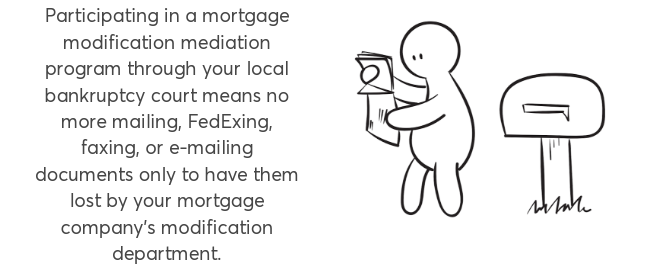Can You Buy a Car While in Chapter 13
In a Nutshell
Filing bankruptcy and keeping your house is possible. Whether you can file bankruptcy and keep your house depends on your unique circumstances. Here's what you need to know.
Homeownership has long been part of the "American Dream." If you're overwhelmed with debt, don't let your fear about losing your home stop you from getting bankruptcy relief. Especially if paying your creditors is putting your ability to pay your home mortgage at risk.
Will I lose my house in bankruptcy?
The truth is that filing a bankruptcy case is an extremely effective way to get rid of the debt you can't pay. This can make it easier for you to keep your home, not the other way around.
How filing bankruptcy can make paying your mortgage easier
Your bankruptcy discharge wipes out most (if not all) of your unsecured debts. Medical bills, credit card payments, loan payments, etc. all of the bills that are making it hard for you to make ends meet now are eliminated by a bankruptcy filing.
With debt repayment obligations gone, you can focus on the expenses that really matter: mortgage payments, utilities and regular living expenses.
That's actually true if you're renting, too. Rent will always need to be paid, just like a mortgage, electricity, water and other utilities. But as soon as the automatic stay kicks in, you'll be protected from debt collectors.
What happens to your mortgage when you file bankruptcy?
Home loans, like mortgages, home equity loans, or home equity lines of credit are secured debts. This means the bank has a sort of ownership interest in the real estate. As long as you make your monthly payments, the home is yours to keep. If you don't pay your mortgage, the bank can take the house back by way of a foreclosure. That's true even after you get a bankruptcy discharge.
Because of this, keeping your home means keeping your mortgage. There's no such thing as a free house.
Chapter 7 bankruptcy and your mortgage
Chapter 7 bankruptcy is a relatively fast process. There's no payment plan to repay debts. The filer typically keeps all of their personal property through the use of bankruptcy exemptions.
What does that mean for you?
If you're current with your mortgage payments ➡️ everything will stay basically the same.
You'll continue to make your mortgage payments until the house is paid off. Of course, there are some legal nuances, like the discharge of your personal liability on the home loan, and how it protects you in the event you lose your home down the road, but the important takeaway here is this:
If you have enough income to pay your mortgage lender, you can keep your home even after filing Chapter 7 bankruptcy.
It's a little more complicated if your home is worth more than what you owe on your mortgage. In that case, you may have to deal with the bankruptcy trustee. More on that below.
What if I'm behind on my mortgage?
If you're behind on your mortgage payment and ➡️
-
you don't want to keep the house: Chapter 7 provides a mechanism to surrender the house to the bank and discharge your obligation to pay the loan. This will protect you if your mortgage loan is a "recourse" loan where the bank could otherwise try to collect a deficiency judgment after the foreclosure.
-
you do want to keep the house: Chapter 7 is not ideal. It doesn't provide a mechanism to catch up on your mortgage payments. This means you're still at the mercy of the bank and their willingness to modify your home loan to deal with your arrearage. If you can afford to make your full mortgage payments now, Chapter 13 bankruptcy may offer a solution.
Can I keep my house if I file Chapter 13?
If you have sufficient income to keep up with your mortgage, you will not lose your house. Chapter 13 bankruptcy involves a 3 - 5 year repayment plan. Long-term secured debts, like home mortgages, remain in place. Just like after a Chapter 7 filing, you'll continue to make your regular monthly mortgage payments after filing. In other words…
If you're current with your mortgage payments ➡️ everything will stay basically the same.
What if I'm behind on my mortgage?
Didn't you say Chapter 13 can help me catch up on my mortgage?
We sure did. Because Chapter 13 bankruptcy involves a repayment plan you can use it to catch up missed payments. Depending on where you live, you may have a few options to save your home from foreclosure.
Catching Up
You can take up to 5 years to catch up your missed payments. But, your monthly income must be enough to cover both the plan payments (to catch up your home loan) and the regular monthly mortgage payments going forward.
Mortgage Modification
Many bankruptcy courts have established a mortgage modification mediation program to provide assistance to homeowners going through a Chapter 13 bankruptcy. It can't force the bank to do anything the bank isn't already doing. What it can (and does) do is streamline the process.

You'll still have to submit certain documents and information, but everything is handled through an online portal all participants have to use. Once you submit the paperwork, the bank will review everything to determine whether you meet the criteria for any of their modification programs.
If you don't, a mediation is scheduled where - with the help of a mediator - you can find out exactly why you don't meet the qualifications and what you can do to change the outcome, if anything.
Chapter 13: It's a Marathon, Not a Sprint…
Either way, a Chapter 13 bankruptcy is a long-term commitment. You can accomplish much with it, as long as your goals are realistic. If you're in a mortgage you can't afford, going through the ups and downs of a Chapter 13 bankruptcy can be rough. Especially if you qualify for a fresh start under Chapter 7 bankruptcy.

What do you lose when you file bankruptcy?
Most bankruptcy filers don't lose anything, actually.[ 1 ] Property you own free and clear is yours to keep as long as there's a bankruptcy exemption to protect it.
Property that secures a lender's right to payment of a secured debt (like cars for car loans and real property for mortgage debt) is yours to keep as long as you pay for it. The bankruptcy trustee doesn't even really get involved.
Can a bankruptcy trustee take my home?
It's not common, but it's possible in certain circumstances.
The bankruptcy trustee's job is to sell non-exempt property for the benefit of unsecured creditors. That includes personal property and real property. Whether your home is safe from the trustee depends on whether it has any "nonexempt equity" which in turn depends on its market value.
As a reminder, here's how we calculate equity in this scenario:
| HOME | CAR | |
|---|---|---|
| Value | $100,000 | $12,000 |
| Loan Balance | $80,000 | $9,000 |
| Equity | $20,000 | $3,000 |
If the amount of equity is greater than the homestead exemption amount you can claim, the Bankruptcy Code allows the trustee to use that equity to pay unsecured creditors. Subtract the balance of your mortgage and the available homestead exemption from the total value of the property to find out if you have non-exempt equity. Let's look at a few of examples on what that can look like:
Why Should I File Chapter 7 If I Am Giving Up My Home?
The answer here depends on whether you're on the hook for a deficiency balance after the foreclosure or have other debt you're struggling to pay.
Does a bankruptcy filing even make sense if my lender is going to foreclose anyway?
Some individuals do not think they need to file Chapter 7 if they are giving up their home. Filing a Chapter 7 bankruptcy case has many benefits, even if you're not hanging on to a house with an expensive mortgage. Some of the benefits of filing for debt relief under Chapter 7 include:
No Deficiency Judgment
When a lender forecloses on a home, it can request a deficiency judgment. When you file Chapter 7 and surrender the home, the lender does not receive a deficiency judgment. If you already have a deficiency judgment against you, filing Chapter 7 will get rid of it.
Get Rid of Other Debts
Filing Chapter 7 gets rid of most, if not all, your unsecured debts. That means you can get rid of credit card debt, medical bills, old rent payments, some old income tax debt, old utility bills, payday advance loans, and most personal loans.
Let's Summarize…
Whether bankruptcy is right for you depends on a number of factors but the fact that you own your home doesn't have to be one of them. If your home is protected in a bankruptcy filing, your fresh start may actually make your mortgage payments more manageable.
Sources:
- American Bankruptcy Institute. ( 2002 ). Bankruptcy by the Numbers - Chapter 7 Asset Cases. ABI Journal . Retrieved August 4, 2020, from https://www.abi.org/abi-journal/chapter-7-asset-cases
↑ Back to top
Can You Buy a Car While in Chapter 13
Source: https://upsolve.org/learn/can-bankruptcy-take-your-house/
0 Response to "Can You Buy a Car While in Chapter 13"
Post a Comment